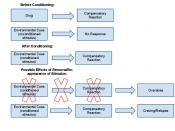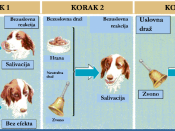Learning may be defined as a relatively permanent change in behavior, capability, or attitude that is acquired through experience and cannot be attributed to illness, injury, or maturation.
We learn in three different ways: Classical conditioning, operant or instrumental conditioning, and observational learning.
Classical or Pavlovian conditioning:
stimulus -- Any event or object in the environment to which an organism responds; plural is stimuli.
unconditioned stimulus (US): A stimulus that elicits a specific response without prior learning.
unconditioned response (UR): A response that is invariably elicited by the
unconditioned stimulus without prior learning.
conditioned stimulus (CS): A neutral stimulus that, after repeated pairing with an unconditioned stimulus, becomes associated with it and elicits a conditioned response.
conditioned response: A learned response rather than a naturally occurring one.
conditioned response (CR): A response that comes to be elicited by a conditioned stimulus as a result of its repeated pairing with an unconditioned stimulus.
extinction: The disappearance of a learned response; the conditioned response is weakened by repeated presentation of the conditioned stimulus without the unconditioned stimulus.
spontaneous recovery: The reappearance of an extinguished response (in a weaker form) when an organism is exposed to the original conditioned stimulus following a rest period.
generalization: The tendency to make a conditioned response to a stimulus that is similar to the original conditioned stimulus.
discrimination: The learned ability to distinguish between similar stimuli so that the conditioned response occurs only to the original conditioned stimulus but not to similar stimuli.
Instrumental or Operant Conditioning
reinforcer: Anything that strengthens a response or increases the probability that it will occur.
shaping: Gradually moulding a desired behavior by reinforcing responses that become progressively closer to it; reinforcing successive approximations of the desired response.
successive approximations: A series of gradual training steps, with each step becoming more...



Excellent.
A FINE essay/group of notes. Very informative and no errors as far as I can tell. Good work!
3 out of 3 people found this comment useful.